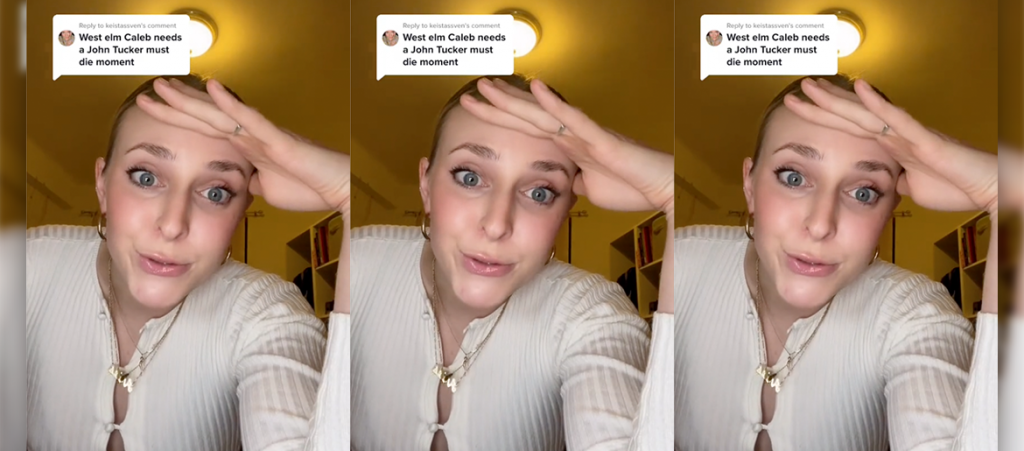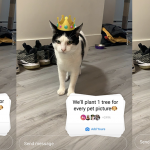
Am I late to the West Elm Caleb story? Look, yes. The TikTok videos have stopped and all the hot takes have been published (including House Beautiful’s gross, now-deleted article full of West Elm affiliate links). But there are still important things to discuss that go beyond whether what happened to this guy and these women was ‘right’ or ‘wrong’. This fleeting, viral story and all of our reactions to it (yes, that includes you and I, as The Audience) is a perfect microcosm of the skewed ethics and imbalanced power and justice systems that govern our real lives.
Basically, this happened because women still feel powerless in society – and while that doesn’t mean the girl gang was right, it does mean this will happen again.
Recap: Who Is West Elm Caleb?
Even though this isn’t really an essay about West Elm Caleb – it’s about soft power, who wields it, and why – we do need to be on the same page about what happened, before we can get to the lessons. So, the briefest of recaps is this:
A woman living in New York City posted a TikTok about a guy she met on Hinge who ghosted her. Quickly, other NYC-based women started to figure out they all had similar experiences and interactions with the same guy, in overlapping timeframes. So, they nicknamed him ‘West Elm Caleb’ (after his workplace) and started sharing their stories of his shady dating behaviour. Some claimed to have met him in person, others never did. They shared messages he supposedly sent them, and some even shared pictures of him. All of the stories are unconfirmed, and it all took place without his consent as Caleb never revealed himself or made any comment. Within the space of 24 to 36 hours, the videos dominated TikTok’s infamous For You Page.
The reception to the videos generally fell into two camps:
- Those who believe bad dating behaviour like this deserves to be called out, and;
- Those who believed it was a one-sided pile-on, like the Couch Guy saga, but somehow worse. At least Couch Guy knew he was being filmed, and presumably gave the ok to his girlfriend to upload their video, right?
@andrewdowningnyc I will not stop until I find it #westelmcaleb #nyc ♬ Law and Order – Main Theme – Geek Music
Do We Agree On What ‘Private’ and ‘Harmful’ Mean?
That’s at the core of the first tension in this story. As a private citizen, when is it okay to publicly call out another private citizen for ‘bad’ behaviour? Clearly this is different to calling out public figures like a celebrities, politicians or business leaders, whose actions do not benefit from what Dr Simon Longstaff, Executive Director of The Ethics Centre, calls the “expectation of privacy”.
“There are a number of different dimensions, but firstly do people go into [an interaction] believing with reasonable grounds that what they say and do will be a private exchange between them and the other person? That’s where you start. My guess is that there wouldn’t be anyone who would think it was automatically okay to have what they’re exchanging on these apps to be disclosed.”
That assumption is worth probing though. Do we all agree on what constitutes a private space online? The fact that parents of the digital generations (Millennials and Gen Z) have, since the age of Neopets, told us to be careful what you put on the Internet is a clue. The warning speaks to two truths: digital permanence means anything you post could follow your name forever, and you don’t own or control that information anyway – the digital platforms do.
With that in mind, do we believe dating app messages are private? Are tweets from behind a locked account private? Are Instagram DMs private? Do we expect them to be? When Zee Feed readers DM me on Instagram with questions that might make them sound dumb or opinions that are controversial, some of them specifically request anonymity if I decide to share. But the majority don’t. When influencers publish the hateful DMs they receive, with usernames and names on full display, the trolls often claim it’s unfair to be publicly called out… because the message they sent was ‘private’ and therefore the abuse should have to be endured by the victim.
Should it? No, of course not. Dr Longstaff says the presumption of privacy can be ditched to address serious harm: “You’ve got to have reasonable grounds to think that the nature of the harms proposed to be done is sufficiently serious to constitute the breach in favor of privacy. There’s certain circumstances where you could set it aside, and one obvious example is if you think that the person represents a threat to others, such that they ought to be warned.”
That’s the second major tension here: what constitutes ‘real’ or ‘sufficient’ harm? What damage, fear, pain or threat is worthy of breaking the expectation of privacy for? Sometimes the line is clear – in most mainstream digital spaces abusive messages are considered sufficiently serious to report (therefore, reveal). But in many instances, we don’t all agree on what is serious enough and there is no way of knowing before you go public with something. For as many people who think that the women were silly to claim they were seriously hurt by Caleb’s supposed transgressions (ghosting, love bombing, gaslighting), there are just as many saying the emotional damage is real and shouldn’t be dismissed.
In our increasingly online lives, the lack of consensus on privacy and pain – two core elements underpinning ethical behaviour – explains a lot.
@greyzindacity I love this new united community the nyc girlies have 🥰 #exposingmen #hinge #nycdating #nyc #datingstorytime #datingapps #westelmcaleb #ghosting #CloseYourRings #ArbysDiabloDare #fyp #foryou ♬ original sound – grace
But Why? Inequitable Systems of Power & Justice
Regardless of whether you think the women putting Caleb on blast were wrong or right, know that stories like this will continue to happen over and over and over again because of the harsh power imbalances that still exist in the real world.
I questioned Dr Longstaff on whether ethical theory accounts for power. “When it comes to historical and present injustice, and power, where people have been denied opportunity… When you’ve been on the receiving end of that, whenever there is a chance to ‘even the score’, it’s tempting to do it. You know, it’s understandable but that doesn’t make it right.”
Women’s time and labor is arguably still not viewed as equal, women’s pain not taken seriously by medical professionals, women’s valid fear of men often disregarded by authorities. Women have limited access to structural protection or justice – just look at increasing rates of violence against women and scary low rates of sexual assault convictions. If you’re a poor woman, a Black or brown woman, trans or gender non-conforming woman, a woman with a disability, or any combination of intersecting identities, the outlook is even worse.
Under the weight of all that, of course it’s tempting to wield some of the only power you have access to: soft and social power, amplified by digital algorithms. We inflict reputational damage in the absence of justice. You can see it in the way many creatives on social media enforce “a strict honour code of ‘giving credit’” as an alternative to copyright, knowing full well the legal protection they deserve can only be enforced by those with wealth and privilege.
That cycle will keep repeating, the dynamics baking itself further into our digital spaces unless we address the big, meaty problems of inequity and injustice. That’s really hard though – the alternative of throwing around soft power, although ineffectual, is much easier.




Comments are closed.